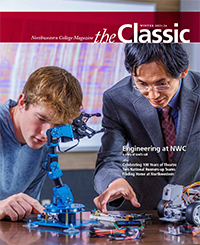Northwestern adds new major options
Thursday, April 23, 2015
Northwestern College will offer two new majors—biochemistry and worship arts—beginning this fall.
The biochemistry major is designed for students interested in research and intending to either enroll in graduate school or pursue a career in the field after graduating from Northwestern. “The biochemistry industry in Iowa is big and getting bigger with all of the genetic research being done,” says Dr. David Arnett, professor of chemistry, “so this will serve students well who are interested in that line of work.”
Previously, Northwestern students wanting biochemistry would double-major in biology and chemistry. The biochemistry major is more streamlined and allows students to focus more on what interests them. Core requirements for the new major include biology, chemistry, math and physics courses. Also required is an independent research project pre-approved by the biochemistry advisory committee.
Arnett and Dr. Karissa Carlson, chair of Northwestern’s chemistry department, anticipate partnering with schools like the University of Iowa and the University of Kansas on summer research projects for Northwestern students. “For graduate school, it’s really important to get research experience at a research-focused institution—and in some cases, to have had research experience in multiple settings,” Carlson explains. “The biochemistry major’s research requirement helps meet that expectation.”
The other new major, worship arts, is an interdisciplinary major that will prepare students for a future career in worship design and leadership. Core and elective requirements include courses in religion, theatre, English, music, art and communications.
Drew Schmidt, an assistant professor of theatre at Northwestern, has led worship at different churches for more than a decade. He designed the major with another Northwestern theatre professor, Jeff Barker, who teaches in the doctoral program at the Robert E. Webber Institute for Worship Studies and is the author of “The Storytelling Church.”
According to Schmidt, the role of worship arts impacts everything from the greeters at the door to the graphics on the screen, from testimonies shared and Scripture presented, to the songs sung and the words spoken from the platform.
“As the needs of churches grow,” he says, “we need to listen to the local body say, ‘This is who we are and this is how we’re going to express it’—and then find people who can do those things well and give them the space to be excellent. This is about serving the local church, rooted in a firm foundation of theology. We’re not just making performers. We’re making disciples to serve the church. We want to develop leaders of all the arts to help the church’s worship.”

